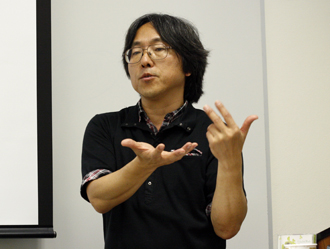Empathy in a Disaster Zone
Takashi Fujioka, a visiting scholar from Japan who specializes in social work burnout prevention, has designed a new method for monitoring mental health professionals working in a disaster zone. Fujioka spent several months in New Orleans working with the Tulane Traumatology Institute at the Tulane School of Social Work to help mental health professionals in Japan after the recent earthquake and tsunami.

Takashi Fujioka, a social work visiting professor, develops a disaster-services monitoring method for mental health providers. (Photo by Joseph Halm)
A professor of social work at the Japan College of Social Work, Fujioka survived the March 11 earthquake disaster. “It was like a slow-moving horror show,” he says.
“Trauma is not only a primary experience for those who suffer through it,” he says. “It also affects those who help the trauma victims. It is something that everyone experiences.”
Charles Figley, the Paul Henry Kurzweg Chair in Disaster Mental Health at the School of Social Work, has worked with Fujioka on compassion fatigue and child trauma since 2005, but this time, Fujioka tried something never done before.
Fujioka surveyed 50 Japanese mental health professionals about their experiences prior to, during and for six months following their deployment to the disaster zone. A summary of the findings was sent to the participants who were asked to respond to the results and to indicate levels of resilience and explain what helped and did not help.
To date, Fujioka has found that the mental health professionals who reported moderate levels of trauma while dispensing mental health services received the best service rating from their clients.
“If you're hurting a little bit, that's good,” says Figley. “Fujioka has found evidence that challenge the assertion that those who are not traumatized at all do the best work.” The data suggest that practitioners working with traumatized people may perform more effectively when they experience similar stress and discomfort as their clients and they are able to nurture themselves as well as their clients.
Joseph Halm is marketing/communications coordinator for the Tulane School of Social Work.
